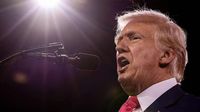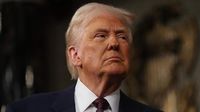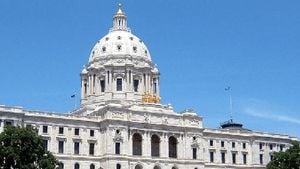Experts have drawn alarming parallels between the rhetoric of former President Donald Trump and that of Adolf Hitler, sparking serious concerns regarding Trump's approach to political discourse. Olivier Mannoni, the French translator of Hitler's notorious manifesto, Mein Kampf, stated in a recent interview that he recognizes elements of Hitler's style in Trump's speeches and statements. "I recognize Hitler's style in Donald Trump. This is absolutely frightening," Mannoni expressed, underscoring the potential dangers of such comparisons.
Mannoni further explained that he sees Trump as repeatedly drawing from Mein Kampf, specifically citing his use of derogatory phrases to describe opponents and his inflammatory remarks about migrants. He noted that at a campaign event in New Hampshire at the end of 2023, Trump vowed to "eradicate the communists, Marxists, fascists, and radical left thugs that live like vermin in our country." This language mirrors Hitler's derogatory references to political adversaries, raising alarm among political analysts and historians alike.
In parallel, the Democratic campaign, which included then-Vice President Kamala Harris, juxtaposed statements from Hitler and Trump on social media, pointing out the troubling similarities in their rhetoric. A communications chief for Joe Biden’s campaign stated, "In Trump finds the rhetoric of Hitler and Mussolini a resonant echo. We will ensure that people understand how dangerous this is," highlighting the perceived urgency of addressing this issue.
Historian Anne Applebaum echoed these sentiments in her October 2024 commentary, noting that such rhetoric was previously absent from American presidential politics. She argued that with Trump in office, a line had been crossed—a statement echoed by her article in The Atlantic that claimed Trump "speaks like Hitler, Stalin, and Mussolini."
As concerns over Trump's rhetoric mount, his administration's policies also invite scrutiny. In December 2023, Trump defended deportations under the historical Alien Enemies Act of 1798, which allows the president to expel the nationals of hostile states. However, this action was met with legal challenges, leading a court to impose a temporary halt to the deportations. Despite this, Tom Homan, who served as Trump's 'Border Czar', was defiant about the contrary ruling, asserting that the opinions of judges were irrelevant to Trump's agenda. "I can tell you, those were bad people," Homan stated on camera, signaling a blatant disregard for judicial authority.
Legal experts have criticized Trump's understanding of the law, suggesting he views it merely as a tool for exercising power. US Constitutional lawyer Russell Miller emphasized that Trump utilizes the law to support his interests without recognizing its limits. "For Trump, the law cannot and should not serve as a boundary to his power," Miller remarked. This stokes fears of a potential constitutional crisis in American governance, as Trump seems willing to sidestep legal obligations that traditionally guide executive authority.
Shayana Kadidal, a lawyer from the Center for Constitutional Rights, described Trump's approach as an attempt to project himself as the sole leader capable of breaking laws in the name of public safety. He aims to dismantle the perceived bureaucratic barriers within governance to implement his vision, even as such moves raise significant ethical and legal questions.
Judicial responses resemble historical instances of executive overreach, prompting comparisons with the Bush administration's controversial policies in the 2000s. As Miller noted, many previous presidents have skirted traditional constraints, but the outright dismissal of court rulings marks a troubling trend. "If Trump continues to ignore court rulings, the situation cannot be described any other way than as a constitutional crisis," he warned, pressing the need for a serious national conversation about democracy's future under Trump.
The implications of these discussions raise critical questions about the health of American democracy. With Trump's appointment of three judges to the Supreme Court, the legal landscape has shifted, presenting further complications for judicial recourse against executive actions. Amidst growing trepidation, Miller emphasizes the importance of judicial resistance against these actions, indicating that the courts and state governments may be the last bastions of authority in maintaining checks and balances.
Looking ahead, the 2026 elections pose a potentially pivotal moment. A shift in congressional control could usher in a critical evaluation of Trump's actions. If Congress manages to regain its authority, even impeachment becomes a potential reality, evoking historical parallels with Richard Nixon's resignation ahead of likely impeachment amid his own legal controversies.
Contrastingly, Miller notes the risk of apathy within the societal response to Trump’s increasing legislative audacity. If the courts and public do not challenge his actions, democracy may face a muted demise, likened to past moments of national strife during the 1860s. As the nation grapples with its identity and governance structure, the echoes of the past resound powerfully, nudging the electorate to engage with these pressing concerns.





